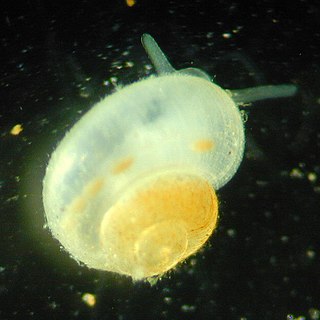
Orthogastropoda was a major taxonomic grouping of snails and slugs, an extremely large subclass within the huge class Gastropoda according to the older taxonomy of the Gastropoda.

Rissooidea is a superfamily of tiny aquatic snails.

Littorinimorpha is a large order of snails, gastropods, consisting primarily of sea snails, but also including some freshwater snails and land snails.

Buccinoidea is a taxonomic superfamily of very small to large predatory sea snails, marine gastropod mollusks.

Hydrobiidae, commonly known as mud snails, is a large cosmopolitan family of very small freshwater and brackish water snails with an operculum; they are in the order Littorinimorpha.

The Buccinidae are a very large and diverse taxonomic family of large sea snails, often known as whelks or true whelks.

Planorbidae, common name the ramshorn snails or ram's horn snails, is a family of air-breathing freshwater snails, aquatic pulmonate gastropod molluscs. Unlike most molluscs, the blood of ram's horn snails contains iron-based hemoglobin instead of copper-based hemocyanin. As a result, planorbids are able to breathe oxygen more efficiently than other molluscs. The presence of hemoglobin gives the body a reddish colour. This is especially apparent in albino animals.

Bithyniidae is a family of small freshwater snails with an operculum, aquatic gastropod molluscs in the clade Littorinimorpha.

Potamopyrgus is a genus of minute freshwater snails with an operculum, aquatic gastropod molluscs or micromolluscs in the family Tateidae.

Gyraulus is a genus of small, mostly air-breathing, freshwater snails, aquatic pulmonate gastropod mollusks in the family Planorbidae, the ram's horn snails.

Pseudamnicola is a genus of small brackish water snails with an operculum, aquatic gastropod mollusks in the subfamily Pseudamnicolinae of the family Hydrobiidae.

Rissoidae is a large family of sea snails. Members of the Rissoidae are very small in size and possess an operculum.

Tornidae is a family of very small and minute sea snails with an operculum, marine gastropod mollusks in the clade Littorinimorpha. This family used to be known as the Vitrinellidae. Iredale has shown that the family Adeorbidae Monterosato, 1884 should be called Tornidae

The Neotaenioglossa is a taxonomic name for a large group of mostly sea snails. The name was originally created by Haller in 1882. Ponder and Warén (1988), and Marquet (1997), assigned this name to the superorder Caenogastropoda. ITIS considers the order Neotaenioglossa to be a synonym of Cerithioidea Férussac, 1819 .

Cochliopidae is a family of small freshwater snails with gills and an operculum, aquatic gastropod mollusks.

Pomatiopsidae is a family of small, mainly freshwater snails, that have gills and an operculum, aquatic gastropod mollusks in the superfamily Truncatelloidea.

Lithoglyphidae is a family of small freshwater snails with gills and an operculum, aquatic gastropod mollusks.
The taxonomy of the Gastropoda, as revised by Winston Ponder and David R. Lindberg in 1997, is an older taxonomy of the class Gastropoda, the class of molluscs consisting of all snails and slugs. The full name of the work in which this taxonomy was published is Towards a phylogeny of gastropod molluscs: an analysis using morphological characters.

Moitessieriidae is a family of small freshwater snails, aquatic gastropod molluscs in the superfamily Truncatelloidea.

Tateidae is a family of very small and minute aquatic snails with an operculum, gastropod molluscs in the superfamily Truncatelloidea.


















